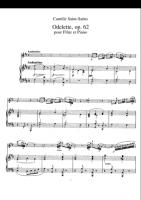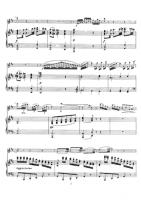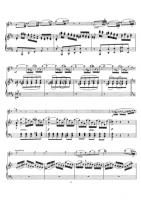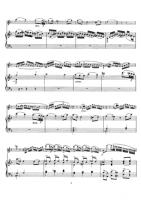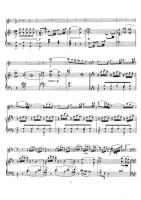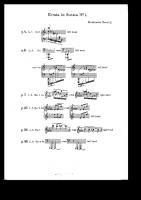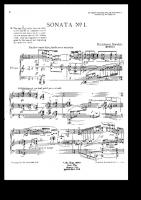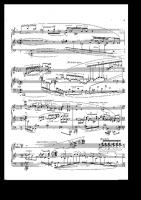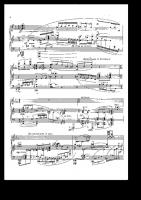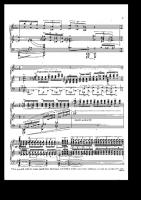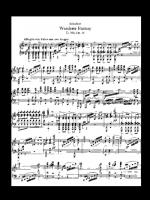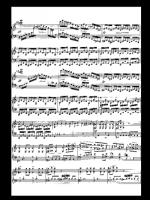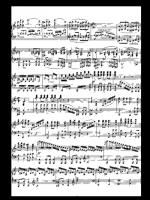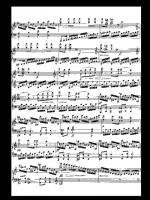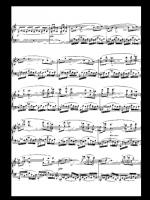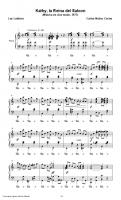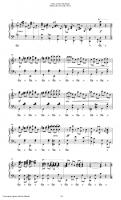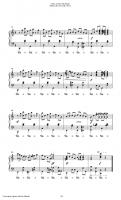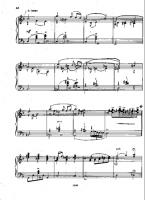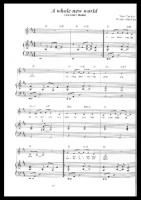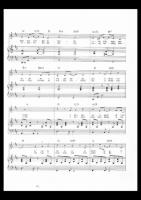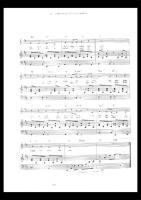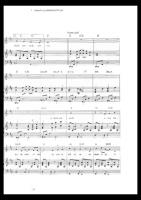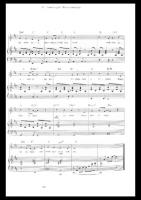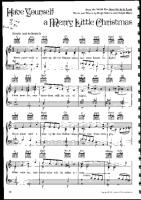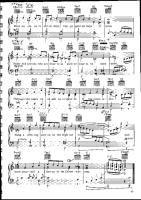Latest Sheets
Suzuki method
 The Suzuki method is a music curriculum and teaching philosophy dating from the mid-20th century, created by Japanese violinist and pedagogue Shinichi Suzuki (1898–1998). The method aims to create an environment for learning music which parallels the linguistic environment of acquiring a native language. Suzuki believed that this environment would also help to foster good moral character.
The Suzuki method is a music curriculum and teaching philosophy dating from the mid-20th century, created by Japanese violinist and pedagogue Shinichi Suzuki (1898–1998). The method aims to create an environment for learning music which parallels the linguistic environment of acquiring a native language. Suzuki believed that this environment would also help to foster good moral character.
Neil Gow.
Saint Saens
 Charles-Camille Saint-Saëns (9 October 1835 – 16 December 1921) was a French composer, organist, conductor, and pianist, known especially for The Carnival of the Animals, Danse Macabre, Samson and Delilah, Havanaise, Introduction and Rondo capriccioso, and his Symphony No. 3 (Organ Symphony).
Charles-Camille Saint-Saëns (9 October 1835 – 16 December 1921) was a French composer, organist, conductor, and pianist, known especially for The Carnival of the Animals, Danse Macabre, Samson and Delilah, Havanaise, Introduction and Rondo capriccioso, and his Symphony No. 3 (Organ Symphony).
Kazuhiko Katou
 Kazuhiko Katō, nicknamed "Tonovan", was a Japanese record producer, songwriter and singer. He sometimes used the spelling of "Kazuhiko Katoh".
Kazuhiko Katō, nicknamed "Tonovan", was a Japanese record producer, songwriter and singer. He sometimes used the spelling of "Kazuhiko Katoh".
Itibere Zwarg
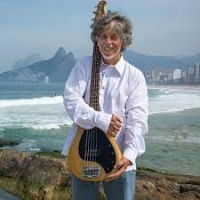 Itiberê Zwarg is an award-winning Brazilian bassist and the longest-serving member of Hermeto Pascoal's ground-breaking ensemble 'O Grupo'.
Itiberê Zwarg is an award-winning Brazilian bassist and the longest-serving member of Hermeto Pascoal's ground-breaking ensemble 'O Grupo'.
Guerra Peixe
 César Guerra-Peixe was a Brazilian violinist, composer, and conductor. Guerra-Peixe was born in Petrópolis, son of Portuguese immigrants with Romani origins.
César Guerra-Peixe was a Brazilian violinist, composer, and conductor. Guerra-Peixe was born in Petrópolis, son of Portuguese immigrants with Romani origins.
Jim Brickman
 Jim Brickman (born November 20, 1961) is an American composer and pianist. Brickman is known for his solo piano compositions, which are classified as new age music. However, he is as well known for his original love songs and performing them with vocalists such as Martina McBride, Michael W. Smith, Michelle Wright and others.
Jim Brickman (born November 20, 1961) is an American composer and pianist. Brickman is known for his solo piano compositions, which are classified as new age music. However, he is as well known for his original love songs and performing them with vocalists such as Martina McBride, Michael W. Smith, Michelle Wright and others.His music career started when he was nineteen, when Jim Henson hired him to write tunes for Sesame Street. He was also hired to write commercial jingles while in college.
Brickman signed with Windham Hill Records to release his first album, No Words, in 1994. The song "Rocket To The Moon" from that album was the first solo instrumental song ever to be ranked on Billboard's charts. Four of his albums (By Heart, Picture This, The Gift, and Destiny) have all sold over 500,000 copies, qualifying them as gold records in the United States.
Brickman writes a wide variety of music. Besides his piano compositions and love songs, he has also created arrangements of other songs. Several of his albums feature arrangements of children's music; he has produced two Christmas-themed albums The Gift (1997) and Peace (2003); and his 2005 album Grace concentrates on arrangements of well-known Christian music.
Alex North
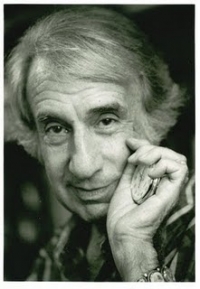 Alex North (December 4, 1910 – September 8, 1991) was an American composer who wrote the first jazz-based film score (A Streetcar Named Desire) and one of the first modernist scores written in Hollywood (Viva Zapata!).
Alex North (December 4, 1910 – September 8, 1991) was an American composer who wrote the first jazz-based film score (A Streetcar Named Desire) and one of the first modernist scores written in Hollywood (Viva Zapata!).Born Isadore Soifer in Chester, Pennsylvania, North was an original composer probably even by the classical music standards of the day. However, he managed to integrate his modernism into typical film music leitmotif structure, rich with themes. One of these became the famous song, "Unchained Melody". Nominated for 14 Oscars but unsuccessful each time, North and Ennio Morricone are the only film composers to receive the Lifetime Achievement Academy Award. North's frequent collaborator as orchestrator was the avant-garde composer Henry Brant. He won the 1968 Golden Globe award for his music to The Shoes of the Fisherman.
His best-known film scores include The Rainmaker (1956), Spartacus (1960), The Misfits (1961),The Children's Hour (1961) Cleopatra (1963), Who's Afraid of Virginia Woolf? (1966), and The Devil's Brigade (1968). His commissioned score for Stanley Kubrick's 2001: A Space Odyssey (1968) was discarded by the director, but has since been released on CD.
Though North is best known for his work in Hollywood, he spent years in New York writing music for the stage; he composed the score, by turns plaintive and jarring, for the original Broadway production of Death of a Salesman. It was in New York that he met Elia Kazan (director of Salesman), who brought him to Hollywood in the '50s. North was one of several composers who brought the influence of contemporary concert music into film, in part marked by an increased use of dissonance and complex rhythms. But there is also a lyrical quality to much of his work which may be connected to the influence of Aaron Copland, with whom he studied.
His classical works include a Rhapsody for Piano, Trumpet obbligato and Orchestra. He was nominated for a Grammy Award for his score for the 1976 television miniseries Rich Man, Poor Man. North is also known for his opening to the CBS television anthology series Playhouse 90.
Kaikhosru Shapurji Sorabji
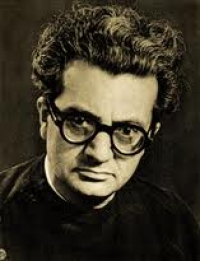 Kaikhosru Shapurji Sorabji (14 August 1892 – 15 October 1988) (born Leon Dudley Sorabji) was an English composer, music journalist, and pianist.
Kaikhosru Shapurji Sorabji (14 August 1892 – 15 October 1988) (born Leon Dudley Sorabji) was an English composer, music journalist, and pianist.He occupies a curious place in the repertoire. Several of his works are of extraordinary length and difficulty, making them inaccessible to many pianists. In a letter from Sorabji to his good friend Peter Warlock, he writes, "You claim that I write monstrosities which only the composer can play. What if they were meant only for the composer?" One of his most famous works, Opus Clavicembalisticum—the fame enhanced by once being listed in the Guinness Book of Records as the longest piano work ever written—has a reputation as a mythic, nearly impossible staple of the super-virtuoso repertoire. However, its difficulties are not insurmountable, and it has been recorded several times. Many of his major piano works have not been recorded at all, and some others have had recordings of selected movements only. Much of his work is very melodic with combinations of lush, piquant and dissonant harmonies. The record label Altarus intends to eventually release a full discography of the composer's work.
Martin Schneider
 Martin Gotthard Schneider was a German theologian, church musician, Landeskantor, songwriter, and academic teacher. He is known for prize-winning songs of the genre Neues Geistliches Lied, such as "Danke" and "Ein Schiff, das sich Gemeinde nennt".
Martin Gotthard Schneider was a German theologian, church musician, Landeskantor, songwriter, and academic teacher. He is known for prize-winning songs of the genre Neues Geistliches Lied, such as "Danke" and "Ein Schiff, das sich Gemeinde nennt".
Joseph Haydn
 Franz Joseph Haydn (31 March 1732 – 31 May 1809), known as Joseph Haydn (German pronunciation: ; English: /ˈdʒoʊzəf ˈhaɪdən/), was an Austrian composer, one of the most prolific and prominent composers of the Classical period. He is often called the "Father of the Symphony" and "Father of the String Quartet" because of his important contributions to these genres. He was also instrumental in the development of the piano trio and in the evolution of sonata form.
Franz Joseph Haydn (31 March 1732 – 31 May 1809), known as Joseph Haydn (German pronunciation: ; English: /ˈdʒoʊzəf ˈhaɪdən/), was an Austrian composer, one of the most prolific and prominent composers of the Classical period. He is often called the "Father of the Symphony" and "Father of the String Quartet" because of his important contributions to these genres. He was also instrumental in the development of the piano trio and in the evolution of sonata form.A life-long resident of Austria, Haydn spent much of his career as a court musician for the wealthy Hungarian aristocratic Esterházy family on their remote estate. Isolated from other composers and trends in music until the later part of his long life, he was, as he put it, "forced to become original". At the time of his death, he was one of the most celebrated composers in Europe.
Joseph Haydn was the brother of Michael Haydn, himself a highly regarded composer, and Johann Evangelist Haydn, a tenor. He was also a close friend of Wolfgang Amadeus Mozart and a teacher of Ludwig van Beethoven.
Real Book
 The Real Book refers to compilations of lead sheets for jazz standards. It usually refers to the first volume of a series of books transcribed and collated by Berklee College of Music students during the 1970s.The name is derived from "fake books", so called because they contained only rough outlines of music pieces rather than fully notated scores. Early fake books were often used by professional bands who performed mostly standards, often more geared to society and dance bands rather than jazz ensembles, and devoted much space to show tunes, novelty tunes, traditional jazz, etc. The first three Real Book volumes, in contrast, contained many bebop and other jazz standards that were likely to be encountered on jazz gigs at the time. For this reason, the books were quickly adopted among jazz players in the 1970s, particularly on the east coast.
The Real Book refers to compilations of lead sheets for jazz standards. It usually refers to the first volume of a series of books transcribed and collated by Berklee College of Music students during the 1970s.The name is derived from "fake books", so called because they contained only rough outlines of music pieces rather than fully notated scores. Early fake books were often used by professional bands who performed mostly standards, often more geared to society and dance bands rather than jazz ensembles, and devoted much space to show tunes, novelty tunes, traditional jazz, etc. The first three Real Book volumes, in contrast, contained many bebop and other jazz standards that were likely to be encountered on jazz gigs at the time. For this reason, the books were quickly adopted among jazz players in the 1970s, particularly on the east coast.
Franz Schubert
 Franz Peter Schubert (German pronunciation: ; January 31, 1797 – November 19, 1828) was an Austrian composer. He wrote some 600 Lieder, nine symphonies (including the famous "Unfinished Symphony"), liturgical music, operas, some incidental music, and a large body of chamber and solo piano music. He is particularly noted for his original melodic and harmonic writing.
Franz Peter Schubert (German pronunciation: ; January 31, 1797 – November 19, 1828) was an Austrian composer. He wrote some 600 Lieder, nine symphonies (including the famous "Unfinished Symphony"), liturgical music, operas, some incidental music, and a large body of chamber and solo piano music. He is particularly noted for his original melodic and harmonic writing.Schubert was born into a musical family, and received formal musical training through much of his childhood. While Schubert had a close circle of friends and associates who admired his work (amongst them the prominent singer Johann Michael Vogl), wide appreciation of his music during his lifetime was limited at best. He was never able to secure adequate permanent employment, and for most of his career he relied on the support of friends and family. He made some money from published works, and occasionally gave private musical instruction. In the last year of his life he began to receive wider acclaim. He died at the age of 31 of "typhoid fever", a diagnosis which was vague at the time; several scholars suspect the real illness was tertiary syphilis.
Interest in Schubert's work increased dramatically in the decades following his death. Composers like Franz Liszt, Robert Schumann and Felix Mendelssohn discovered, collected, and championed his works in the 19th century, as did musicologist Sir George Grove. Franz Schubert is now widely considered to be one of the greatest composers in the Western tradition.
Traditional
 traditional music
traditional music
M Ryan Taylor
 He enjoys photography, gardening, singing, drawing, writing, reading, painting, and playing Tuba . . . among other things. View the Wikipedia article on M. Ryan Taylor.
He enjoys photography, gardening, singing, drawing, writing, reading, painting, and playing Tuba . . . among other things. View the Wikipedia article on M. Ryan Taylor.
Stephen Adams
 Michael Maybrick (31 January 1841 – 26 August 1913) was an English composer and singer, best known under his pseudonym Stephen Adams as the composer of "The Holy City," one of the most popular religious songs in English.
Michael Maybrick (31 January 1841 – 26 August 1913) was an English composer and singer, best known under his pseudonym Stephen Adams as the composer of "The Holy City," one of the most popular religious songs in English.
The Music Tech Dictionary
 The Music Tech Dictionary" provides the definitive glossary of music technology and pro audio topics and terms. It focuses on the terminology, techniques, and formats that are common in the audio and music technology field, and offers concise, pithy explanations of what each term represents. Users will be able to look up any music software, music technology, or audio related term they run across in their software, in articles, or in studios, for a short, complete overview.
The Music Tech Dictionary" provides the definitive glossary of music technology and pro audio topics and terms. It focuses on the terminology, techniques, and formats that are common in the audio and music technology field, and offers concise, pithy explanations of what each term represents. Users will be able to look up any music software, music technology, or audio related term they run across in their software, in articles, or in studios, for a short, complete overview.
Les luthiers
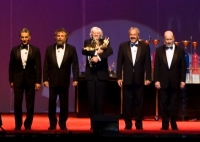 Les Luthiers is an Argentine comedy-musical group, very popular also in several other Spanish-speaking countries including Paraguay, Guatemala, Peru, Chile, Ecuador, Spain, Colombia, Mexico, Uruguay, Bolivia, Cuba, Costa Rica and Venezuela. They were formed in 1967 by Gerardo Masana, during the height of a period of very intense choral music activity in Argentina's state universities. Their outstanding characteristic is the home-made musical instruments (hence the name luthiers, French for "musical instrument maker"), some of them extremely sophisticated, which they skillfully employ in their recitals to produce music and texts full of high class and refined humor. From 1977 until his death in 2007, they worked with Roberto Fontanarrosa, a renowned Argentine cartoonist and writer.
Les Luthiers is an Argentine comedy-musical group, very popular also in several other Spanish-speaking countries including Paraguay, Guatemala, Peru, Chile, Ecuador, Spain, Colombia, Mexico, Uruguay, Bolivia, Cuba, Costa Rica and Venezuela. They were formed in 1967 by Gerardo Masana, during the height of a period of very intense choral music activity in Argentina's state universities. Their outstanding characteristic is the home-made musical instruments (hence the name luthiers, French for "musical instrument maker"), some of them extremely sophisticated, which they skillfully employ in their recitals to produce music and texts full of high class and refined humor. From 1977 until his death in 2007, they worked with Roberto Fontanarrosa, a renowned Argentine cartoonist and writer.
Jon Schmidt
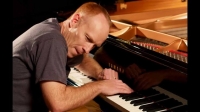 Jon Schmidt (born 1966) is an American pianist, composer, piano teacher, and author. Classically trained, he branched into New Age music in his 20s and has developed a classical crossover style that blends classical, contemporary, and rock and roll. He has released eight solo albums and seven piano books containing original scores. Since 2010 he has been a member of The Piano Guys musical group, performing on their YouTube videos, albums, and in concert.
Jon Schmidt (born 1966) is an American pianist, composer, piano teacher, and author. Classically trained, he branched into New Age music in his 20s and has developed a classical crossover style that blends classical, contemporary, and rock and roll. He has released eight solo albums and seven piano books containing original scores. Since 2010 he has been a member of The Piano Guys musical group, performing on their YouTube videos, albums, and in concert.
Leslie Wagle
 she is a female musician doing new age arrangements and cover music.
she is a female musician doing new age arrangements and cover music.
Carly Comando
 Carly Comando's single "Everyday" is well known as the score to the popular short film "Noah K. Everday" (see below) which has been viewed 4,000,000 times on YouTube alone. The film has been featured on the CBS News, Good Morning America and VH1's Big In 'O6 Awards. As part of a photo project beginning in January 2000, Noah Kalina has taken a picture of himself in an identical pose every single day...for the last 6 years. The film feature a rapid fire sequence of nearly 2,400 photos. Noah continues to photograph himself and plans on releasing another video on the ten year anniversary and every five years after that. Noah is currently featured on VH1's 40 Greatest Internet Superstars in 14th Place.
Carly Comando's single "Everyday" is well known as the score to the popular short film "Noah K. Everday" (see below) which has been viewed 4,000,000 times on YouTube alone. The film has been featured on the CBS News, Good Morning America and VH1's Big In 'O6 Awards. As part of a photo project beginning in January 2000, Noah Kalina has taken a picture of himself in an identical pose every single day...for the last 6 years. The film feature a rapid fire sequence of nearly 2,400 photos. Noah continues to photograph himself and plans on releasing another video on the ten year anniversary and every five years after that. Noah is currently featured on VH1's 40 Greatest Internet Superstars in 14th Place. "Everyday" is also the theme music to the NBA's commercial montage "Where Amazing Happens" which is currently airing on ESPN, VH1, MTV and several other stations to promote the 2007-2008 NBA season (see below).
Natalie Walker
 Natalie Walker is an American vocalist, songwriter and musician from Indiana who first came to prominence as part of the group Daughter Darling. While her time in the low-key electronica trip hop outfit was promising, Walker decided on a solo career, and released her first album Urban Angel in 2006, which was produced by the duo Stuhr (Dan Chen and Nate Greenberg). The album made minor waves commercially, but it was a pair of songs from the full-length that helped Walker's career, one of which, a remix of "Quicksand", was featured in the Sofia Coppola film Marie Antoinette, while another, "Waking Dream", was featured in the film Circles, made it to television, and was featured in an episode of Grey's Anatomy. Her follow-up, With You, was released in 2008, and also featured production by Stuhr. Walker's EP titled Spark was released on June 21, 2011 via Dorado music and features production by Ted Bruner (Katy Perry, Kesha, Plain White T's) and Dan Chen and Nate Greenberg of Stuhr, the Brooklyn-based production team behind 200'’s With You and her 2006 solo debut.
Natalie Walker is an American vocalist, songwriter and musician from Indiana who first came to prominence as part of the group Daughter Darling. While her time in the low-key electronica trip hop outfit was promising, Walker decided on a solo career, and released her first album Urban Angel in 2006, which was produced by the duo Stuhr (Dan Chen and Nate Greenberg). The album made minor waves commercially, but it was a pair of songs from the full-length that helped Walker's career, one of which, a remix of "Quicksand", was featured in the Sofia Coppola film Marie Antoinette, while another, "Waking Dream", was featured in the film Circles, made it to television, and was featured in an episode of Grey's Anatomy. Her follow-up, With You, was released in 2008, and also featured production by Stuhr. Walker's EP titled Spark was released on June 21, 2011 via Dorado music and features production by Ted Bruner (Katy Perry, Kesha, Plain White T's) and Dan Chen and Nate Greenberg of Stuhr, the Brooklyn-based production team behind 200'’s With You and her 2006 solo debut.
Regina Spektor
 Regina Spektor (born February 18, 1980) is a Soviet-born Jewish-American singer-songwriter and pianist. Her music is associated with the anti-folk scene centered on New York City's East Village.
Regina Spektor (born February 18, 1980) is a Soviet-born Jewish-American singer-songwriter and pianist. Her music is associated with the anti-folk scene centered on New York City's East Village.Spektor has said that she has created 700 songs, but that she rarely writes any of them down. She has also stated that she never aspired to write songs herself, but songs seem to just flow to her. Spektor possesses a broad vocal range and uses the full extent of it. She also explores a variety of different and somewhat unorthodox vocal techniques, such as verses composed entirely of buzzing noises made with the lips and beatbox-style flourishes in the middle of ballads, and also makes use of such unusual musical techniques as using a drum stick to tap rhythms on the body of the piano or chair.
Her lyrics are equally eclectic, often taking the form of abstract narratives or first-person character studies, similar to short stories or vignettes put to song. Spektor usually sings in English, though she sometimes includes a few words or verses of Latin, Russian, French, and other languages in her songs.
Oscar Peterson
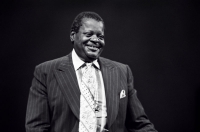 Oscar Emmanuel Peterson, CC, CQ, O.Ont. (August 15, 1925 – December 23, 2007) was a Canadian jazz pianist and composer. He was called the "Maharaja of the keyboard" by Duke Ellington, "O.P." by his friends, and was a member of jazz royalty. He released over 200 recordings, won seven Grammy Awards, and received other numerous awards and honours over the course of his career. He is considered to have been one of the greatest jazz pianists of all time, who played thousands of live concerts to audiences worldwide in a career lasting more than 65 years.
Oscar Emmanuel Peterson, CC, CQ, O.Ont. (August 15, 1925 – December 23, 2007) was a Canadian jazz pianist and composer. He was called the "Maharaja of the keyboard" by Duke Ellington, "O.P." by his friends, and was a member of jazz royalty. He released over 200 recordings, won seven Grammy Awards, and received other numerous awards and honours over the course of his career. He is considered to have been one of the greatest jazz pianists of all time, who played thousands of live concerts to audiences worldwide in a career lasting more than 65 years.
S. Simons
Arsenio Rodríguez
 Arsenio Rodríguez (born Ignacio Arsenio Travieso Scull; 31 August 1911 – 30 December 1970) was a Cuban musician, composer and bandleader. He played the tres, as well as the tumbadora, and he specialized in son, rumba and other Afro-Cuban music styles. In the 1940s and 1950s Rodríguez established the conjunto format and contributed to the development the son montuno, the basic template of modern-day salsa. He claimed to be the true creator of the mambo and was an important as well as a prolific composer who wrote nearly two hundred songs.
Arsenio Rodríguez (born Ignacio Arsenio Travieso Scull; 31 August 1911 – 30 December 1970) was a Cuban musician, composer and bandleader. He played the tres, as well as the tumbadora, and he specialized in son, rumba and other Afro-Cuban music styles. In the 1940s and 1950s Rodríguez established the conjunto format and contributed to the development the son montuno, the basic template of modern-day salsa. He claimed to be the true creator of the mambo and was an important as well as a prolific composer who wrote nearly two hundred songs.
Marc Bolan
 Marc Bolan was an English musician, singer, songwriter, record producer, and poet. He is known as one of the pioneers of the glam rock movement of the early 1970s with his band T. Rex.
Marc Bolan was an English musician, singer, songwriter, record producer, and poet. He is known as one of the pioneers of the glam rock movement of the early 1970s with his band T. Rex.
Brahms
 Johannes Brahms (May 7, 1833 â April 3, 1897) was a German composer of the Romantic period. He was born in Hamburg and in his later years he settled in Vienna, Austria.
Johannes Brahms (May 7, 1833 â April 3, 1897) was a German composer of the Romantic period. He was born in Hamburg and in his later years he settled in Vienna, Austria.Brahms maintained a Classical sense of form and order in his works â in contrast to the opulence of the music of many of his contemporaries. Thus many admirers (though not necessarily Brahms himself) saw him as the champion of traditional forms and "pure music," as opposed to the New German embrace of program music.
Brahms venerated Beethoven: in the composer's home, a marble bust of Beethoven looked down on the spot where he composed, and some passages in his works are reminiscent of Beethoven's style. The main theme of the finale of Brahms's First Symphony is reminiscent of the main theme of the finale of Beethoven's Ninth, and when this resemblance was pointed out to Brahms he replied that any ass â jeder Esel â could see that.
Ein deutsches Requiem was partially inspired by his mother's death in 1865, but also incorporates material from a Symphony he started in 1854, but abandoned following Schumann's suicide attempt. He once wrote that the Requiem "belonged to Schumann". The first movement of this abandoned Symphony was re-worked as the first movement of the First Piano Concerto.
Brahms also loved the Classical composers Mozart and Haydn. He collected first editions and autographs of their works, and edited performing editions. He also studied the music of pre-classical composers, including Giovanni Gabrieli, Johann Adolph Hasse, Heinrich Schütz and especially Johann Sebastian Bach. His friends included leading musicologists, and with Friedrich Chrysander he edited an edition of the works of François Couperin. He looked to older music for inspiration in the arts of strict counterpoint; the themes of some of his works are modelled on Baroque sources, such as Bach's The Art of Fugue in the fugal finale of Cello Sonata No. 1, or the same composer's Cantata No. 150 in the passacaglia theme of the Fourth Symphony's finale.
Blues Brothers
 The Blues Brothers are an American blues and soul revivalist band founded in 1978 by comedians Dan Aykroyd and John Belushi as part of a musical sketch on Saturday Night Live. Belushi and Aykroyd fronted the band, in character, respectively, as lead vocalist 'Joliet' Jake Blues and harmonica player/vocalist Elwood Blues. The band was composed of well-known musicians, and debuted as the musical guest in a 1978 episode of Saturday Night Live, opening the show performing "Hey Bartender", and later "Soul Man".
The Blues Brothers are an American blues and soul revivalist band founded in 1978 by comedians Dan Aykroyd and John Belushi as part of a musical sketch on Saturday Night Live. Belushi and Aykroyd fronted the band, in character, respectively, as lead vocalist 'Joliet' Jake Blues and harmonica player/vocalist Elwood Blues. The band was composed of well-known musicians, and debuted as the musical guest in a 1978 episode of Saturday Night Live, opening the show performing "Hey Bartender", and later "Soul Man".
Ne-Yo
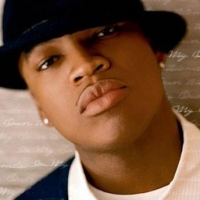 Shaffer Chimere Smith (October 18, 1982), better known by his stage name Ne-Yo, is an American R&B and pop singer-songwriter, record producer, dancer, actor and occasional rapper.
Shaffer Chimere Smith (October 18, 1982), better known by his stage name Ne-Yo, is an American R&B and pop singer-songwriter, record producer, dancer, actor and occasional rapper.Ne-yo began music as a rapper and had one hit single called "Boy Can't You See Im Black?" but after that never made it big so decided to call it quits on the rapping and began to turn his attention to singing.
Ne-Yo's debut album, In My Own Words, was released in early 2006 through Def Jam Recordings, and debuted at number one on Billboard 200, selling over 301,000 copies in the first week and certified platinum, selling nearly 2 million copies in the US and 4 million worldwide. During the same week, Ne-Yo's Stargate-produced second single "So Sick" reached number one on the Billboard Hot 100 chart. Ne-Yo is as famous for his songwriting as for his singing, writing such songs as Rihanna's top ten hit "Unfaithful" and number-one hit Take a Bow, Mario's "Let Me Love You", Mario Vazquez's "Gallery", Paula DeAnda's "Walk Away (Remember Me)", and Beyoncé's Billboard Hot 100 ten-week number-one hit "Irreplaceable".
His second album, Because of You, was released on May 1, 2007. The first single from the platinum-selling album was "Because of You". He has also written songs for Whitney Houston, Celine Dion, Britney Spears, Corbin Bleu, and Enrique Iglesias for their upcoming albums. Smith also has stated that he will write songs for Craig David, Usher, Chris Brown, Jennifer Hudson, Leona Lewis, and he recently confirmed that he has been contacted by producer will.i.am to work on Michael Jackson's upcoming album.
Giovanni Allevi
 Giovanni Allevi (; born in Ascoli Piceno, April 9, 1969) is an Italian pianist and composerAllevi attained a "first-class diploma" both in piano at the "F. Morlacchi" conservatoire in Perugia and in composition at the "G. Verdi" academy of music in Milan. He graduated cum laude in Philosophy with a thesis entitled "Il vuoto nella Fisica contemporanea" (The Void in Contemporary Physics) and he attended the Accademia Internazionale di Alto Perfezionamento in Arezzo, under maestro Carlo Alberto Neri.
Giovanni Allevi (; born in Ascoli Piceno, April 9, 1969) is an Italian pianist and composerAllevi attained a "first-class diploma" both in piano at the "F. Morlacchi" conservatoire in Perugia and in composition at the "G. Verdi" academy of music in Milan. He graduated cum laude in Philosophy with a thesis entitled "Il vuoto nella Fisica contemporanea" (The Void in Contemporary Physics) and he attended the Accademia Internazionale di Alto Perfezionamento in Arezzo, under maestro Carlo Alberto Neri.
Final Fantasy VIII
 Final Fantasy VIII (ファイナルファンタジーVIII Fainaru Fantajī Eito) is a role-playing video game developed and published by Square for the PlayStation console. Released in 1999, it is the eighth main installment in the Final Fantasy series. Set on an unnamed fantasy world with science fiction elements, the game follows a group of young mercenaries, led by Squall Leonhart, as they are drawn into a conflict sparked by the sorceress Edea. After defeating Edea, the protagonists learn that she was under the control of Ultimecia, a sorceress from the future who wishes to compress time. During the quest to defeat Ultimecia, Squall struggles with his role as leader and develops a romance with one of his comrades, Rinoa Heartilly.
Final Fantasy VIII (ファイナルファンタジーVIII Fainaru Fantajī Eito) is a role-playing video game developed and published by Square for the PlayStation console. Released in 1999, it is the eighth main installment in the Final Fantasy series. Set on an unnamed fantasy world with science fiction elements, the game follows a group of young mercenaries, led by Squall Leonhart, as they are drawn into a conflict sparked by the sorceress Edea. After defeating Edea, the protagonists learn that she was under the control of Ultimecia, a sorceress from the future who wishes to compress time. During the quest to defeat Ultimecia, Squall struggles with his role as leader and develops a romance with one of his comrades, Rinoa Heartilly.Development began in 1997, during the English localization of Final Fantasy VII. The game builds on the visual changes brought to the series by Final Fantasy VII, including use 3D graphics and pre-rendered backgrounds, while also departing from many Final Fantasy traditions. It is the first Final Fantasy to use realistically proportioned characters consistently, feature a vocal piece as its theme music, forego the use of magic points for spellcasting, and deviate from the series' traditional means of increasing a character's power.
Final Fantasy VIII was mostly well received by critics, who praised its originality and visuals while criticizing some of its gameplay elements. It was voted the 22nd-best game of all time in 2006 by readers of the Japanese magazine Famitsu. The game was a commercial success; 13 weeks after its release, Final Fantasy VIII had earned more than US$50 million in sales, making it the fastest-selling Final Fantasy title until Final Fantasy XIII, a multi-platform release. It was later ported to Windows-based personal computers and became available on PlayStation Network as a PSone Classics title in 2009. As of December 2013, it has sold more than 8.5 million copies worldwide.
The Secret Garden
 The Secret Garden is a musical based on the 1909 novel of the same name by Frances Hodgson Burnett. The musical's book and lyrics are by Marsha Norman, with music by Lucy Simon. It premiered on Broadway at the St. James Theatre on 25 April 1991 and closed on 3 January 1993 after 709 performances.
The Secret Garden is a musical based on the 1909 novel of the same name by Frances Hodgson Burnett. The musical's book and lyrics are by Marsha Norman, with music by Lucy Simon. It premiered on Broadway at the St. James Theatre on 25 April 1991 and closed on 3 January 1993 after 709 performances.The musical, set in 1906, tells of a young English girl, Mary, who is forced to move to England from colonial India when her parents die in a cholera outbreak. There she lives with her emotionally stunted Uncle Archibald and her invalid cousin. Discovering a hidden and neglected garden, and bravely overcoming dark forces, she and a young gardener bring it back to life at the same time as she brings new life to her cousin and uncle.
The Secret Garden garnered the 1991 Tony Awards for Best Book of a Musical, Best Featured Actress in a Musical (Daisy Eagan), and Best Scenic Design (Heidi Landesman). The set resembled an enormous Victorian toy theatre with pop-out figures, large paper dolls, and Joseph Cornell-like collage elements.
Dvorak
 Antonín Leopold Dvořák (September 8, 1841 – May 1, 1904) was a Czech composer of Romantic music, who employed the idioms and melodies of the folk music of his native Bohemia and Moravia. His works include operas, symphonic, choral and chamber music. His best-known works are his New World Symphony (particularly the slow movement), as well as his Slavonic Dances, American String Quartet, and Cello Concerto in B minor.
Antonín Leopold Dvořák (September 8, 1841 – May 1, 1904) was a Czech composer of Romantic music, who employed the idioms and melodies of the folk music of his native Bohemia and Moravia. His works include operas, symphonic, choral and chamber music. His best-known works are his New World Symphony (particularly the slow movement), as well as his Slavonic Dances, American String Quartet, and Cello Concerto in B minor.Dvořák wrote in a variety of forms: his nine symphonies generally stick to classical models that Beethoven would have recognised, but he also worked in the newly developed symphonic poem form and the influence of Richard Wagner is apparent in some works. Many of his works also show the influence of Czech folk music, both in terms of rhythms and melodic shapes; perhaps the best known examples are the two sets of Slavonic Dances. Dvořák also wrote operas (the best known of which is Rusalka); serenades for string orchestra and wind ensemble; chamber music (including a number of string quartets, and quintets); songs; choral music; and piano music.
Bach
 Johann Sebastian Bach (31 March 1685 – 28 July 1750) was a German composer and organist whose sacred and secular works for choir, orchestra, and solo instruments drew together the strands of the Baroque period and brought it to its ultimate maturity. Although he introduced no new forms, he enriched the prevailing German style with a robust contrapuntal technique, an unrivalled control of harmonic and motivic organisation in composition for diverse musical forces, and the adaptation of rhythms and textures from abroad, particularly Italy and France.
Johann Sebastian Bach (31 March 1685 – 28 July 1750) was a German composer and organist whose sacred and secular works for choir, orchestra, and solo instruments drew together the strands of the Baroque period and brought it to its ultimate maturity. Although he introduced no new forms, he enriched the prevailing German style with a robust contrapuntal technique, an unrivalled control of harmonic and motivic organisation in composition for diverse musical forces, and the adaptation of rhythms and textures from abroad, particularly Italy and France.Revered for their intellectual depth and technical and artistic beauty, Bach's works include the Brandenburg concertos; the Goldberg Variations; the English Suites, French Suites, Partitas, and Well-Tempered Clavier; the Mass in B Minor; the St. Matthew Passion; the St. John Passion; The Musical Offering; The Art of Fugue; the Sonatas and Partitas for violin solo; the Cello Suites; more than 200 surviving cantatas; and a similar number of organ works, including the celebrated Toccata and Fugue in D Minor.
While Bach's fame as an organist was great during his lifetime, he was not particularly well-known as a composer. His adherence to Baroque forms and contrapuntal style was considered "old-fashioned" by his contemporaries, especially late in his career when the musical fashion tended towards Rococo and later Classical styles. A revival of interest and performances of his music began early in the 19th century, and he is now widely considered to be one of the greatest composers in the Western tradition.
Puccini
 Giacomo Antonio Domenico Michele Secondo Maria Puccini (December 22, 1858 – November 29, 1924) was an Italian composer whose operas, including La Bohème, Tosca, and Madama Butterfly, are among the most frequently performed in the standard repertoire. Some of his arias, such as "O Mio Babbino Caro" from Gianni Schicchi, "Che gelida manina" from La Bohème, and "Nessun Dorma" from Turandot, have become part of popular culture.
Giacomo Antonio Domenico Michele Secondo Maria Puccini (December 22, 1858 – November 29, 1924) was an Italian composer whose operas, including La Bohème, Tosca, and Madama Butterfly, are among the most frequently performed in the standard repertoire. Some of his arias, such as "O Mio Babbino Caro" from Gianni Schicchi, "Che gelida manina" from La Bohème, and "Nessun Dorma" from Turandot, have become part of popular culture.The subject of Puccini's style is one that has been long avoided by musicologists; this avoidance can perhaps be attributed to the perception that his work, with its emphasis on melody and evident popular appeal, lacked "seriousness" (a similar prejudice beset Rachmaninoff during his lifetime). Despite the place Puccini clearly occupies in the popular tradition of Verdi, his style of orchestration also shows the strong influence of Wagner, matching specific orchestral configurations and timbres to different dramatic moments. His operas contain an unparalleled manipulation of orchestral colors, with the orchestra often creating the scene’s atmosphere.
The structures of Puccini's works are also noteworthy. While it is to an extent possible to divide his operas into arias or numbers (like Verdi's), his scores generally present a very strong sense of continuous flow and connectivity, perhaps another sign of Wagner’s influence. Like Wagner, Puccini used leitmotifs to connote characters (or combinations of characters). This is apparent in Tosca, where the three chords which signal the beginning of the opera are used throughout to announce Scarpia. Several motifs are also linked to Mimi and the Bohemians in La Bohème and to Cio-Cio-San's eventual suicide in Butterfly. Unlike Wagner, though, Puccini's motifs are static: where Wagner's motifs develop into more complicated figures as the characters develop, Puccini's remain more or less identical throughout the opera (in this respect anticipating the themes of modern musical theatre).
Alan Menken
 Alan Menken (born July 22, 1949 in New Rochelle, New York) is an American Broadway and an eight-time Academy Award winning composer and pianist. Menken has collaborated with several renowned lyricists including Howard Ashman (1950-1991), Tim Rice and Stephen Schwartz.
Alan Menken (born July 22, 1949 in New Rochelle, New York) is an American Broadway and an eight-time Academy Award winning composer and pianist. Menken has collaborated with several renowned lyricists including Howard Ashman (1950-1991), Tim Rice and Stephen Schwartz.
Bond Quartet
 Together Tania Davis (Violin), Eos Counsell (violin), Elspeth Hanson (viola) and Gay-Yee Westerhoff (cello) complete the line-up of BOND.
Together Tania Davis (Violin), Eos Counsell (violin), Elspeth Hanson (viola) and Gay-Yee Westerhoff (cello) complete the line-up of BOND.At its launch, BOND was hailed in the press as ‘the Spice Girls of Classical music’, and went onto turn the world of classical crossover music on its head, spawning many electric string groups inspired by its unique sound.
The members of BOND draw their inspiration from classical, latin, folk, jazz, rock, pop, electro, Indian and middle eastern styles. They have built a very active and loyal international fan base over the years and, since their debut, BOND have sold over 4 million albums worldwide, making BOND the best-selling string quartet of all time.
Joseph Kosma
 Joseph Kosma was a Hungarian-French composer. Date of birth: October 22, 1905, Budapest, Hungary Date and place of death: August 7, 1969, France
Joseph Kosma was a Hungarian-French composer. Date of birth: October 22, 1905, Budapest, Hungary Date and place of death: August 7, 1969, France
Michael Jackson
 Michael Joseph Jackson (August 29, 1958 – June 25, 2009) was an American singer, dancer and entertainer. Referred to as the King of Pop, he is the most commercially successful entertainer of all time, and one of the most influential. His contributions to music, dance and fashion, along with a much publicized personal life, made him a global figure in popular culture for over four decades.
Michael Joseph Jackson (August 29, 1958 – June 25, 2009) was an American singer, dancer and entertainer. Referred to as the King of Pop, he is the most commercially successful entertainer of all time, and one of the most influential. His contributions to music, dance and fashion, along with a much publicized personal life, made him a global figure in popular culture for over four decades.Alongside his brothers, he made his debut as lead singer and youngest member of The Jackson 5 in 1964. He began his solo career in 1971. His 1982 album Thriller remains the best-selling album ever, with Off the Wall (1979), Bad (1987), Dangerous (1991) and HIStory (1995) also among the world's best-selling albums. He is widely credited with having transformed the music video from a promotional tool into an art form with videos for his songs such as "Billie Jean", "Beat It" and "Thriller" making him the first African American artist to amass a strong crossover following on MTV. With stage performances and music videos, Jackson popularized a number of physically complicated dance techniques, such as the robot and the moonwalk. His distinctive musical sound, vocal style, and choreography, is credited with stretching across and breaking down cultural, racial, economic, generational, and global barriers that has inspired countless pop, rock, R&B and hip hop artists.
One of the few artists to have been inducted into the Rock and Roll Hall of Fame twice, his other achievements feature multiple Guinness World Records—including the "Most Successful Entertainer of All Time"—15 Grammy Awards (including the "Living Legend Award" and the "Lifetime Achievement Award"), 26 American Music Awards (24 only as a solo artist, including one for "Artist of the Century")—more than any artist—, 17 number one singles in the US (including the four as a member of the Jackson 5), and estimated sales of up to 750 million records worldwide making him the world's best selling artist in history.
Jackson's personal relationships and life generated controversy for years. His changing appearance was noticed from the late 1970s onwards, with changes to his nose and to the color of his skin drawing media publicity. He was accused of child sexual abuse in 1993 though no charges were brought, and in 2005 he was tried and acquitted when the jury ruled him not guilty on all charges. He married twice, first in 1994 and again in 1996, and brought up three children, one born to a surrogate mother. While preparing for the This Is It concert tour in 2009, Jackson died at the age of 50 after suffering from cardiac arrest. He reportedly had been administered drugs such as propofol and lorazepam, and his death was ruled a homicide by the Los Angeles County coroner. His death triggered an outpouring of grief from around the world with his globally live broadcast memorial service attracting an audience of up to one billion people; as well as a huge surge in his album sales, resulting in him becoming the best selling artist of 2009 with sales in excess of 8.2 million in the United States where he became the first artist ever to have 4 of the top 20 best-selling albums in a single year, and 29 million albums globally, where he had an unprecedented 8 of the top 25 best-selling albums worldwide.
Ludwig van Beethoven
 Ludwig van Beethoven (/ˈlʊdvɪɡ væn ˈbeɪt(h)oʊvən/ (About this soundlisten); German: (About this soundlisten); baptised 17 December 1770 – 26 March 1827) was a German composer and pianist. A crucial figure in the transition between the classical and romantic eras in classical music, he remains one of the most recognized and influential musicians of this period, and is considered to be one of the greatest composers of all time.
Ludwig van Beethoven (/ˈlʊdvɪɡ væn ˈbeɪt(h)oʊvən/ (About this soundlisten); German: (About this soundlisten); baptised 17 December 1770 – 26 March 1827) was a German composer and pianist. A crucial figure in the transition between the classical and romantic eras in classical music, he remains one of the most recognized and influential musicians of this period, and is considered to be one of the greatest composers of all time.Beethoven was born in Bonn, the capital of the Electorate of Cologne, and part of the Holy Roman Empire. He displayed his musical talents at an early age and was vigorously taught by his father Johann van Beethoven, and was later taught by composer and conductor Christian Gottlob Neefe. At age 21, he moved to Vienna and studied composition with Joseph Haydn. Beethoven then gained a reputation as a virtuoso pianist, and was soon courted by Prince Lichnowsky for compositions, which resulted in Opus 1 in 1795.
Caetano Veloso
 Caetano Emanuel Viana Teles Veloso, or known as Caetano Veloso, is a Brazilian composer, singer, guitarist, writer and political activist. He was recognized as one of the best songwriters of the century and considered Bob Dylan of Brazil.
Caetano Emanuel Viana Teles Veloso, or known as Caetano Veloso, is a Brazilian composer, singer, guitarist, writer and political activist. He was recognized as one of the best songwriters of the century and considered Bob Dylan of Brazil.
Mozart
 Wolfgang Amadeus Mozart, full name Johann Chrysostom Wolfgang Amadeus Mozart (27 January 1756 â 5 December 1791) was a prolific and influential composer of the Classical era. His over 600 compositions include works widely acknowledged as pinnacles of symphonic, concertante, chamber, piano, operatic, and choral music. Mozart is among the most enduringly popular of classical composers, and many of his works are part of the standard concert repertoire.
Wolfgang Amadeus Mozart, full name Johann Chrysostom Wolfgang Amadeus Mozart (27 January 1756 â 5 December 1791) was a prolific and influential composer of the Classical era. His over 600 compositions include works widely acknowledged as pinnacles of symphonic, concertante, chamber, piano, operatic, and choral music. Mozart is among the most enduringly popular of classical composers, and many of his works are part of the standard concert repertoire.Mozart's music, like Haydn's, stands as an archetypal example of the Classical style. His works spanned the period during which that style transformed from one exemplified by the style galant to one that began to incorporate some of the contrapuntal complexities of the late Baroque, complexities against which the galant style had been a reaction. Mozart's own stylistic development closely paralleled the development of the classical style as a whole. In addition, he was a versatile composer and wrote in almost every major genre, including symphony, opera, the solo concerto, chamber music including string quartet and string quintet, and the piano sonata. While none of these genres were new, the piano concerto was almost single-handedly developed and popularized by Mozart. He also wrote a great deal of religious music, including masses; and he composed many dances, divertimenti, serenades, and other forms of light entertainment.
The central traits of the classical style can be identified in Mozart's music. Clarity, balance, and transparency are hallmarks of his work.
The Beatles
 The Beatles were a pop and rock group from Liverpool, England formed in 1960. Primarily consisting of John Lennon (rhythm guitar, vocals), Paul McCartney (bass guitar, vocals), George Harrison (lead guitar, vocals) and Ringo Starr (drums, vocals) throughout their career, The Beatles are recognised for leading the mid-1960s musical "British Invasion" into the United States. Although their initial musical style was rooted in 1950s rock and roll and homegrown skiffle, the group explored genres ranging from Tin Pan Alley to psychedelic rock. Their clothes, styles, and statements made them trend-setters, while their growing social awareness saw their influence extend into the social and cultural revolutions of the 1960s. After the band broke up in 1970, all four members embarked upon solo careers.
The Beatles were a pop and rock group from Liverpool, England formed in 1960. Primarily consisting of John Lennon (rhythm guitar, vocals), Paul McCartney (bass guitar, vocals), George Harrison (lead guitar, vocals) and Ringo Starr (drums, vocals) throughout their career, The Beatles are recognised for leading the mid-1960s musical "British Invasion" into the United States. Although their initial musical style was rooted in 1950s rock and roll and homegrown skiffle, the group explored genres ranging from Tin Pan Alley to psychedelic rock. Their clothes, styles, and statements made them trend-setters, while their growing social awareness saw their influence extend into the social and cultural revolutions of the 1960s. After the band broke up in 1970, all four members embarked upon solo careers.The Beatles are one of the most commercially successful and critically acclaimed bands in the history of popular music, selling over a billion records internationally. In the United Kingdom, The Beatles released more than 40 different singles, albums, and EPs that reached number one, earning more number one albums (15) than any other group in UK chart history. This commercial success was repeated in many other countries; their record company, EMI, estimated that by 1985 they had sold over one billion records worldwide. According to the Recording Industry Association of America, The Beatles have sold more albums in the United States than any other band. In 2004, Rolling Stone magazine ranked The Beatles number one on its list of 100 Greatest Artists of All Time. According to that same magazine, The Beatles' innovative music and cultural impact helped define the 1960s, and their influence on pop culture is still evident today. In 2008, Billboard magazine released a list of top-selling Hot 100 artists to celebrate the chart's fiftieth anniversary; The Beatles reached #1 again.
Anouk
 Anouk Stotijn-Teeuwe (born April 8, 1975) is a Dutch singer. Since 1997 she has released seven pop-rock albums.
Anouk Stotijn-Teeuwe (born April 8, 1975) is a Dutch singer. Since 1997 she has released seven pop-rock albums.Anouk's interest in music began because her mother was a blues singer. Anouk initially sang at weddings and parties with the band Shotgun Wedding, prior to meeting Barry Hay from the Golden Earring, a friend of her ex-husband Edwin Jansen. Hay believed Anouk to have talent, and offered to write some songs for her, one of which was Mood Indigo; written in collaboration with George Kooymans (also from the Golden Earring).
Steve Swallow
 Steve Swallow (born October 4, 1940) is a jazz fusion bassist and composer noted for his collaborations with Jimmy Giuffre, Gary Burton, and Carla Bley. He was one of the first jazz double bassists to switch entirely to electric bass guitar.
Steve Swallow (born October 4, 1940) is a jazz fusion bassist and composer noted for his collaborations with Jimmy Giuffre, Gary Burton, and Carla Bley. He was one of the first jazz double bassists to switch entirely to electric bass guitar.
No Doubt
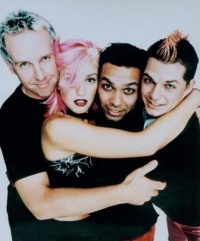 No Doubt is a rock band from Anaheim, California, United States, founded in 1986. The ska-rock sound of its first album failed to make waves due to the popularity of the grunge movement at the time. The band's diamond-certified album Tragic Kingdom helped to launch the ska revival of the 1990s, and "Don't Speak", the third single from the album, set a record when it spent sixteen weeks at the number one spot on the Billboard Hot 100 Airplay chart, later broken by the Goo Goo Dolls' "Iris".
No Doubt is a rock band from Anaheim, California, United States, founded in 1986. The ska-rock sound of its first album failed to make waves due to the popularity of the grunge movement at the time. The band's diamond-certified album Tragic Kingdom helped to launch the ska revival of the 1990s, and "Don't Speak", the third single from the album, set a record when it spent sixteen weeks at the number one spot on the Billboard Hot 100 Airplay chart, later broken by the Goo Goo Dolls' "Iris".The group released its next album, Return of Saturn, four years later, but despite positive reviews, the album was considered a commercial failure. Fifteen months later, the band reappeared with Rock Steady, which incorporated reggae and dancehall music into their work. The album was primarily recorded in Jamaica and featured collaborations with Jamaican artists Bounty Killer, Sly and Robbie, and Lady Saw. The album produced two Grammy-winning singles, "Hey Baby" and "Underneath It All".
No Doubt released the compilation The Singles 1992-2003 and box set Boom Box in 2003, both of which contained a cover version of the Talk Talk synthpop song "It's My Life". Frontwoman Gwen Stefani launched her solo career the next year with several collaborations, including bandmate Tony Kanal and Neptune Pharrell, while guitarist Tom Dumont began his side project, Invincible Overlord. During its career, the band has won two Grammy Awards and sold 27 million records worldwide to date.
Ralph Blane
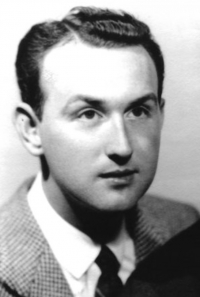 Ralph Blane (July 26, 1914 – November 13, 1995) was an American composer, lyricist, and performer.Blane was born Ralph Uriah Hunsecker in Broken Arrow, Oklahoma. He attended Tulsa Central High School. He studied singing with Estelle Liebling in New York City. He began his career as a radio singer for NBC in the 1930s before turning to Broadway, where he was featured in New Faces of 1936 (1936), Hooray for What! (1937), and Louisiana Purchase (1940). In 1940 he formed a vocal quartet ("The Martins") with his friend Hugh Martin which performed on radio and in nightclubs.
Ralph Blane (July 26, 1914 – November 13, 1995) was an American composer, lyricist, and performer.Blane was born Ralph Uriah Hunsecker in Broken Arrow, Oklahoma. He attended Tulsa Central High School. He studied singing with Estelle Liebling in New York City. He began his career as a radio singer for NBC in the 1930s before turning to Broadway, where he was featured in New Faces of 1936 (1936), Hooray for What! (1937), and Louisiana Purchase (1940). In 1940 he formed a vocal quartet ("The Martins") with his friend Hugh Martin which performed on radio and in nightclubs.
Donna Summer
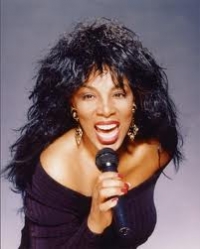 LaDonna Adrian Gaines (born December 31, 1948), known by her stage name, Donna Summer, is an American singer/songwriter who gained prominence during the disco era of the 1970s. Summer is a five-time Grammy winner and was the first artist to have three consecutive double albums reach number one on the US Billboard chart. She also charted four number-one singles in the US within a thirteen-month period.
LaDonna Adrian Gaines (born December 31, 1948), known by her stage name, Donna Summer, is an American singer/songwriter who gained prominence during the disco era of the 1970s. Summer is a five-time Grammy winner and was the first artist to have three consecutive double albums reach number one on the US Billboard chart. She also charted four number-one singles in the US within a thirteen-month period.
Jerry Gray
 Jerry Gray was an American violinist, arranger, composer, and leader of swing dance orchestras bearing his name. He is widely known for his work with popular music during the Swing era. His name is inextricably linked to two of the most famous bandleaders of the time, Artie Shaw and Glenn Miller.
Jerry Gray was an American violinist, arranger, composer, and leader of swing dance orchestras bearing his name. He is widely known for his work with popular music during the Swing era. His name is inextricably linked to two of the most famous bandleaders of the time, Artie Shaw and Glenn Miller.
Wayne Watson
 Wayne Watson (born October 5, 1954) is an American singer-songwriter in contemporary Christian music. Some of his songs have become CCM classics, including "Another Time, Another Place", "For Such a Time as This", "Friend of a Wounded Heart", "Touch of the Master's Hand", "New Lives for Old" and "Watercolour Ponies". He has won eight GMA Dove Awards.
Wayne Watson (born October 5, 1954) is an American singer-songwriter in contemporary Christian music. Some of his songs have become CCM classics, including "Another Time, Another Place", "For Such a Time as This", "Friend of a Wounded Heart", "Touch of the Master's Hand", "New Lives for Old" and "Watercolour Ponies". He has won eight GMA Dove Awards.
Oscar Carmona
 Oscar Carmona Musical artist Songs Mechanical Obsessions Mechanical Obsessions · 2021 Nostalgia Nostalgia · 2021
Oscar Carmona Musical artist Songs Mechanical Obsessions Mechanical Obsessions · 2021 Nostalgia Nostalgia · 2021Inasible III - Ausencia Inasible · 2017
Dr. John
 Malcolm John "Mac" Rebennack, Jr. (born November 21, 1940), better known by the stage name Dr. John (also Dr. John Creaux), is an American singer/songwriter, pianist and guitarist whose music combines blues, pop, jazz as well as Zydeco, boogie woogie and rock and roll.
Malcolm John "Mac" Rebennack, Jr. (born November 21, 1940), better known by the stage name Dr. John (also Dr. John Creaux), is an American singer/songwriter, pianist and guitarist whose music combines blues, pop, jazz as well as Zydeco, boogie woogie and rock and roll. Vivaldi
 Antonio Lucio Vivaldi (March 4, 1678 â July 28, 1741), nicknamed il Prete Rosso ("The Red Priest"), was a Venetian priest and Baroque music composer, as well as a famous virtuoso violinist; he was born and raised in the Republic of Venice. The Four Seasons, a series of four violin concerti, is his best-known work and a highly popular Baroque piece.
Antonio Lucio Vivaldi (March 4, 1678 â July 28, 1741), nicknamed il Prete Rosso ("The Red Priest"), was a Venetian priest and Baroque music composer, as well as a famous virtuoso violinist; he was born and raised in the Republic of Venice. The Four Seasons, a series of four violin concerti, is his best-known work and a highly popular Baroque piece.Many of Vivaldi's compositions reflect a flamboyant, almost playful, exuberance. Most of Vivaldi's repertoire was rediscovered only in the first half of the 20th century in Turin and Genoa and was published in the second half. Vivaldi's music is innovative, breaking a consolidated tradition in schemes; he gave brightness to the formal and the rhythmic structure of the concerto, repeatedly looking for harmonic contrasts and innovative melodies and themes. Moreover, Vivaldi was able to compose nonacademic music, particularly meant to be appreciated by the wide public and not only by an intellectual minority. The joyful appearance of his music reveals in this regard a transmissible joy of composing; these are among the causes of the vast popularity of his music. This popularity soon made him famous in other countries such as France which was, at the time, very independent concerning its musical taste.
Vivaldi is considered one of the composers who brought Baroque music (with its typical contrast among heavy sonorities) to evolve into a classical style. Johann Sebastian Bach was deeply influenced by Vivaldi's concertos and arias (recalled in his Johannes Passion, Matthäuspassion, and cantatas). Bach transcribed a number of Vivaldi's concerti for solo keyboard, along with a number for orchestra, including the famous Concerto for Four Violins and Violoncello, Strings and Continuo (RV 580).
Jacques Ibert
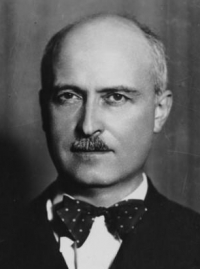 Jacques François Antoine Marie Ibert (15 August 1890 – 5 February 1962) was a French composer of classical music. Having studied music from an early age, he studied at the Paris Conservatoire and won its top prize, the Prix de Rome at his first attempt, despite studies interrupted by his service in World War I.
Jacques François Antoine Marie Ibert (15 August 1890 – 5 February 1962) was a French composer of classical music. Having studied music from an early age, he studied at the Paris Conservatoire and won its top prize, the Prix de Rome at his first attempt, despite studies interrupted by his service in World War I.
Edith Piaf
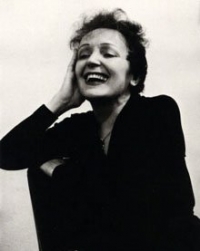 Édith Piaf (19 December 1915—10 October 1963) was a French singer and cultural icon who "is almost universally regarded as France's greatest popular singer." Her singing reflected her life, with her specialty being the ballads. Among her famous songs are "La vie en rose" (1946), "Hymne à l'amour" (1949), "Milord" (1959), "Non, je ne regrette rien" (1960), and Padam Padam.
Édith Piaf (19 December 1915—10 October 1963) was a French singer and cultural icon who "is almost universally regarded as France's greatest popular singer." Her singing reflected her life, with her specialty being the ballads. Among her famous songs are "La vie en rose" (1946), "Hymne à l'amour" (1949), "Milord" (1959), "Non, je ne regrette rien" (1960), and Padam Padam.Edith Piaf's signature song "La vie en rose" was written in 1945 and was voted a Grammy Hall of Fame Award in 1998.
The legendary Paris Olympia concert hall is where Piaf achieved lasting fame, giving several series of concerts at the hall, the most famous venue in Paris, between January 1955 and October 1962. Excerpts from five of these concerts (1955, 1956, 1958, 1961, 1962) were issued on record and CD and have never been out of print. The 1961 concerts were promised by Piaf in an effort to save the venue from bankruptcy and where she debuted her song "Non, je ne regrette rien". In April 1963, Piaf recorded her last song, "L'homme de Berlin".
Martha Mier
 Martha Mier is an independent piano teacher and composer of piano pieces. She resides in Lake City, Florida, where she moved after graduating with honors from Florida State University. She is known for composing "Seventh Street Blues", found in her songbook Jazz, Rags & Blues Book 1. She also composed "Jackson Street Blues", which is being used in the Associated Board of the Royal Schools of Music 2007-08 syllabus as Piano Grade 5 Piece C:1. She is also renowned for her "Romantic Impressions" solo piano books, which contain pieces for beginners to advanced players alike.
Martha Mier is an independent piano teacher and composer of piano pieces. She resides in Lake City, Florida, where she moved after graduating with honors from Florida State University. She is known for composing "Seventh Street Blues", found in her songbook Jazz, Rags & Blues Book 1. She also composed "Jackson Street Blues", which is being used in the Associated Board of the Royal Schools of Music 2007-08 syllabus as Piano Grade 5 Piece C:1. She is also renowned for her "Romantic Impressions" solo piano books, which contain pieces for beginners to advanced players alike.Aside from her skills and duties composing and teaching, she is a member of the Music Teachers National Association, the Florida State Music Teachers Association, and the National Guild of Piano teachers, and is internationally recognised as a composer, teacher and arranger. She also takes part in many competitions in Florida as an adjudicator.
Search for Free Sheet Music
You can make a search through the entire collection of sheets.
You can make a search through the entire collection of sheets.
Hi, fellow musicians!
There is no registration required to download the sheets but you can subscribe to our mailing list to get notified of new sheets.
There is no registration required to download the sheets but you can subscribe to our mailing list to get notified of new sheets.
Latest Artists
Georges Moustaki
× 2
Real Book × 1
Vincent Novello × 1
Masato Nakamura × 1
H. A. Henry × 1
William Gillock × 1
Lars Winnerbäck × 2
Stephen Rippy × 1
Chopin × 8
Michael Haydn × 1
Ottorino Respighi × 1
Ryan Cayabyab × 1
Duffy × 1
Heitor Villa-Lobos × 1
Tenmon × 1
Sally DeFord × 6
Mozart × 8
Duke Ellington × 3
Arthur Hamilton × 1
No Doubt × 1
Frances Allitsen × 1
Felix Blumenfeld × 1
Luigi Boccherini × 2
Armando Manzanero × 1
Otha Young × 1
Beethoven × 2
Cat Stevens × 2
Pyotr Ilyich Tchaikovsky × 1
Porco Rosso × 1
Monteverdi × 1
Loveholic × 1
Erik Satie × 2
François Desjardins × 1
Cindy Walker × 1
J. S. Bach × 4
Chris Brown × 1
Westlife × 1
Keisuke Handa × 1
Dan Matkowsky × 1
Lynyrd Skynyrd × 1
L.A. de Gruyter × 1
Banjo kazooie × 1
Clifford Brown × 1
Shakira × 1
Brahms × 8
Marc Shaiman × 1
Bill Evans × 4
Toots Thielemans × 1
Irwin Levine × 1
Eric Clapton × 1
Real Book × 1
Vincent Novello × 1
Masato Nakamura × 1
H. A. Henry × 1
William Gillock × 1
Lars Winnerbäck × 2
Stephen Rippy × 1
Chopin × 8
Michael Haydn × 1
Ottorino Respighi × 1
Ryan Cayabyab × 1
Duffy × 1
Heitor Villa-Lobos × 1
Tenmon × 1
Sally DeFord × 6
Mozart × 8
Duke Ellington × 3
Arthur Hamilton × 1
No Doubt × 1
Frances Allitsen × 1
Felix Blumenfeld × 1
Luigi Boccherini × 2
Armando Manzanero × 1
Otha Young × 1
Beethoven × 2
Cat Stevens × 2
Pyotr Ilyich Tchaikovsky × 1
Porco Rosso × 1
Monteverdi × 1
Loveholic × 1
Erik Satie × 2
François Desjardins × 1
Cindy Walker × 1
J. S. Bach × 4
Chris Brown × 1
Westlife × 1
Keisuke Handa × 1
Dan Matkowsky × 1
Lynyrd Skynyrd × 1
L.A. de Gruyter × 1
Banjo kazooie × 1
Clifford Brown × 1
Shakira × 1
Brahms × 8
Marc Shaiman × 1
Bill Evans × 4
Toots Thielemans × 1
Irwin Levine × 1
Eric Clapton × 1







